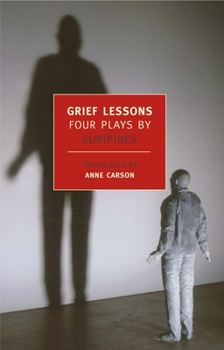Grief Lessons: Four Plays by Euripides
Select Format
Select Condition 
Book Overview
Now in paperback. Euripides, the last of the three great tragedians of ancient Athens, reached the height of his renown during the disastrous Peloponnesian War, when democratic Athens was brought down by its own outsized ambitions. "Euripides," the classicist Bernard Knox has written, "was born never to live in peace with himself and to prevent the rest of mankind from doing so." His plays were shockers- he unmasked heroes, revealing them as foolish and savage, and he wrote about the powerless-women and children, slaves and barbarians-for whom tragedy was not so much exceptional as unending. Euripides' plays rarely won first prize in the great democratic competitions of ancient Athens, but their combustible mixture of realism and extremism fascinated audiences throughout the Greek world. In the last days of the Peloponnesian War, Athenian prisoners held captive in far-off Sicily were said to have won their freedom by reciting snatches of Euripides' latest tragedies. Four of those tragedies are presented here in new translations by the contemporary poet and classicist Anne Carson. They are Herakles , in which the hero swaggers home to destroy his own family; Hekabe , set after the Trojan War, in which Hektor's widow takes vengeance on her Greek captors; Hippolytos , about love and the horror of love; and the strange tragic-comedy fable Alkestis , which tells of a husband who arranges for his wife to die in his place. The volume also contains brief introductions by Carson to each of the plays along with two remarkable framing essays- "Tragedy- A Curious Art Form" and "Why I Wrote Two Plays About Phaidra."
Format:Paperback
Language:English
ISBN:1590172531
ISBN13:9781590172537
Release Date:September 2008
Publisher:New York Review of Books
Length:312 Pages
Weight:0.82 lbs.
Dimensions:0.7" x 5.4" x 7.9"
Customer Reviews
4 ratings
Eros and Necessity
Published by Thriftbooks.com User , 15 years ago
No one writes about eros and "Necessity" (or the Greeks, Common Sense) their twists of irony, and the destructiveness of revenge as does Anne Carson. These plays are as relevant today as they were when written. The translations are fluent, singing poetry. The short prefaces are dynamite. Reflective and provocative. I'm rereading her other books. They are each one inspiring and unique. She is one of our best poets, and philosophers. Whenever my mind is dull, I reach over and pick up Desecration or Irony and Glass.
Family love and hate
Published by Thriftbooks.com User , 18 years ago
This translation of four plays by Euripedes is brilliant, clean and clear, without pretension. It offers the direct gaze of an Athenian at human emotion and human fate, which is considered a matter of luck more than character. For the Athenians matters of state and import are rooted in the family, where everything begins.
Whose got a mop?
Published by Thriftbooks.com User , 18 years ago
There is so much blood letting in these plays I would hate to be the stage manager. What a clean up after every performance. Seriously folks... The plays are spellbinding. The insights into what motivates human beings are brilliant. I enjoyed reading these plays 10 times more than I ever thought I would. I read the review inThe New Yorker and thought I'd take a chance. (I don't normally read the classics) I gave it to my wife who loved the plays as well. Great job.
simple, clear, beautiful
Published by Thriftbooks.com User , 18 years ago
I've owned copies of Euripides all my life and never got around to reading them, but when Grief Lessons came across my desk last week, I was compelled to read straight through it. The title alone speaks of Carson's special talent for reaching the heart of the matter. Grief Lessons. The layout of her character's dialogue, too, flows back and forth along the margins of the page so that your eye moves easily down the text. The characters speak simply, without flourishes, without annoying Victorian poetic touches. Grief Lessons opens up Euripides to you so clearly that you can hear the characters weeping and shouting at each other on the stage of your mind. At the same time, so simple is Carson's translation that her words have an open ended flexibility that let you imagine them being pitched almost any way. Is Admetus a typical egocentric or an oaf? I'd always felt sorry for Hippolytus, cursed unfairly by his father. Now I'd like to curse him myself. I've never seen pomposity in a youth so clearly shown in a play. Moreover, Euripides lived at the end of Greece's golden age. His cynicism of the gods and heroes plays very appropriately on the stage of today.





